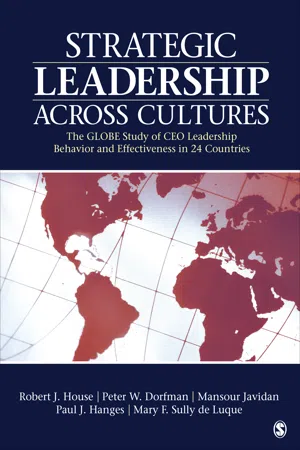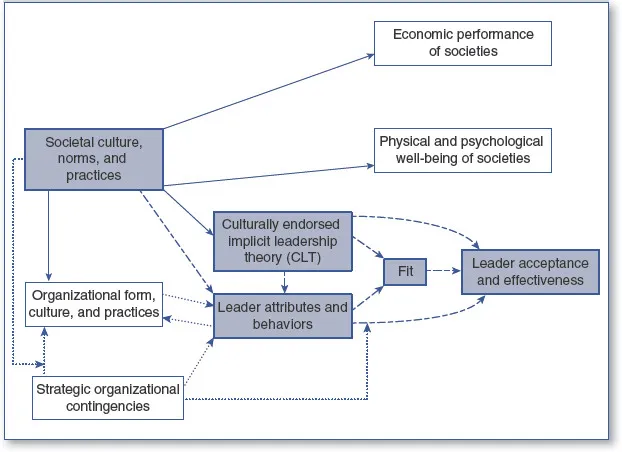![]()
| 1 | Societal Culture and Leadership |
| GLOBE History, Theory, and Summary of Previous Findings |
The 21st century should be, if it is not already, the century of international management research.
—Tsui, Nifadkar, and Ou (2007)
Culture is the greatest of all moderators.
—Harry Triandis (1993)
To succeed in this complex business environment, leaders will need to adopt a set of characteristics and traits that enables them to move fluidly across different cultures.
—James Turley, chief executive officer (CEO) of Ernst & Young (2010)
The importance of executive leaders to the success of their organizations is widely acknowledged (cf. Finkelstein, Hambrick, & Cannella, 2009; Zaccaro & Klimoski, 2001). The Global Leadership and Organizational Behavior Effectiveness (GLOBE) research project presented in this book has the principal goal of determining how societal leadership expectations influenc executive leadership behavior and effectiveness. The current project is a continuation of the previous GLOBE research started in the early 1990s whereby investigators have been studying the interrelationships among societal culture, societal effectiveness, and societal leadership expectations. However, in contrast to earlier GLOBE research (House, Hanges, Javidan, Dorfman, & Gupta, 2004), the focus of this book is on executive leadership behavior and its effectiveness. Specifically, our study focuses on the behavior and performance of chief executive officers (CEOs) and their top management teams (TMTs).
Although there are compelling reasons for understanding the influence of societal culture on leadership and organizational processes, only during the past two decades has there been an increased interest in studying leadership in multiple cultures (including non-Western cultures). Contemporary reviews of leadership theories by cross-cultural researchers generally espouse the perspective that leadership theories developed and tested in one culture may not apply to other cultures (Aycan, 2008; Dickson, Castaño, Magomaeva, & Den Hartog, 2012). While this perspective about the importance of cultural contingencies has recently gained acceptance, many prominent leadership theories were either developed before this zeitgeist or tacitly assumed that leadership processes and theories generally transcend cultures (Dorfman, 2004). Yet convincing evidence exists that there are inherent limitations in transferring theories across cultures; what works in one culture may not be valid in other cultures. As Triandis (1993) suggested in the quote given at the beginning of the chapter, because societal culture has proven to be an important moderator in social science research, leadership researchers should be able to “fine-tune” theories by investigating cultural variations as moderators or parameters of those theories.
In addition, by focusing on potential cross-cultural effects, researchers are more likely to uncover new relationships by including a much broader range of variables often not considered in contemporary theories, such as the importance of religion, language, ethnic background, history, or political systems (Chemers, 1993). Essentially, cross-cultural research may identify limiting conditions and specific cultural differences that are relevant for understanding leadership processes and outcomes (Yukl, 2013). In short, GLOBE investigators believe that cross-cultural researchers should thoughtfully view current leadership theories within a contingency framework whereby cultural variables are incorporated as antecedents and/or moderators. With this contingency perspective, we may begin to answer a fundamental question as to the extent to which leadership theories generated and tested in one culture generalize to different cultures (Yukl, 2013). The present project attacks this question from the GLOBE theoretical basis presented by House and colleagues (2004) and subsequently revised from the results of previous GLOBE efforts.
Practical reasons also exist for understanding the role of societal cultures’ influence on leadership and organizational processes. The knowledge gained from cross-cultural research will assist organizations in the selection and development of leaders with the necessary multicultural skills to become effective in multicultural environments (see the Turley (2010) quote at the beginning of the chapter). This knowledge can directly improve firm performance and profitability as CEOs strive to increase their firm’s presence and sales in foreign markets. As William Green (former chairman and CEO of Accenture) (2009) stated, it is important to focus on growing market share and expanding business in key geographic markets with a special emphasis on Brazil, Russia, India, China, South Korea, and Mexico. In one recent survey of more than 500 senior executives at 100 corporations, the Economist Intelligence Unit (EIU) (Bolchover, 2012) reported that 75% of the respondents’ corporations were planning to compete in foreign markets. Another survey of 520 senior business executives reported that 50% of these executives expect their corporations to receive more revenue from foreign markets than from their domestic markets (Turley, 2010). Pursuing global markets, global supply chain partners, and global talent pools are high priorities for contemporary corporations, and cross-cultural leadership skills are critical to success. As Howard and Wellins (2008) noted, “Mobilizing teams and working across cultures” are the top two vital leadership competencies for developing globally successful leaders. The importance of developing globally minded executives has also not been lost on emerging market multinationals (EMMs) who increasingly view global business savvy to be a key to their success (Foster, 2008). In short, increased global exposure of corporations has raised managerial interest in understanding national cultures and their influence on executives and corporations.
Robert House founded the GLOBE research program in 1991 to enhance the scholarly literature on this important topic. GLOBE is a multiphase, multimethod, multisample project in which investigators spanning the world are examining, among other things, the interrelationships between societal culture and organizational leadership. Over 200 social scientists and management scholars from nearly 69 cultures representing all major regions of the world are engaged in this programmatic series of cross-cultural leadership studies. We studied 62 countries in the first two GLOBE phases and 24 countries in the latest phase of GLOBE. Of the latter 24 countries, 17 were in common with the first two phases (in total, 69 countries were represented in the combined research). We studied over 900 domestic corporations in the 62 countries in Phases 1 and 2 and over 1,000 corporations in Phase 3.
In this chapter of the book, we describe the rationale, theory, and findings from the GLOBE project up to this latest (i.e., Phase 3) study. We summarize our perspectives on culture and leadership—what we now know, what we still don’t know, and what we may soon know. The chapter ends with a discussion of why we chose to proceed with the CEO study reported in this book. Chapter 2 reviews the current state of literature regarding the intriguing relationship between culture and leadership. Chapter 3 describes our rationale, hypotheses, research design, and analytical strategy. Insights gained from our 20-year effort, along with the extant literature, have enabled us to modify our original theoretical model (House et al., 2004) to the one presented in Figure 1.1. We intend to provide evidence throughout this book that leadership matters, executive leadership matters greatly, and societal cultures influence the leadership behaviors that are expected and effective.
GLOBE: A Primer
Since its inception in the early 1990s, the GLOBE project has grown into an enormous research effort involving more than 200 researchers from multiple academic disciplines located throughout the world. GLOBE investigators set out to explore the fascinating and complex effects of culture on leadership and organizational effectiveness. Among our goals, we strove to make the project applicable to many facets of cross-cultural interaction beyond simply conducting an in-depth study of societal culture and organizational behavior. To this end, GLOBE 2004 stated the following:
Some scholars believe that worldwide distribution of movies, TV programs, restaurant chains, travel, MBA programs, and educational exchange opportunities (Child & Tayeb, 1983; Werther, 1996; Yavas, 1995) will result in cultural uniformity. However, cultural differences have been the proverbial “elephants in the room,” and businesses ignore them at their peril currently and in the future. Cultural misunderstandings have led to numerous failures in cross-cultural mergers, acquisitions, and market penetration (Stahl & Javidan, 2009). Furthermore, in a recent survey of CEOs, executives identified mobilizing teams and working across cultures as the top two critical leadership competencies in their corporations (Howard & Wellins, 2008). In another survey of 1,000 internationally oriented Chinese companies (China Daily, 2012) these executives indicated the major challenge in establishing overseas business was cultural differences. Further, complexity theory suggests that even with free-flowing information, pockets of cultural heterogeneity will persist, emerge, and flourish (Marion & Uhl-bien, 2001). As Nisbett (2003) has shown, thousands of years of history are behind the unique development of cultures around the world, and it is simplistic to expect massive convergence of thinking in a few years.
GLOBE Theoretical Model
The GLOBE theoretical model (House et al., 2004) was proposed as a fully integrative theory linking culture, leadership, and organizational effectiveness. The theory not only relates national culture to aspects of leadership and organizational processes but also asserts that culture has a sustained influence on societal human welfare and the economic success of that culture. Our theory, which continues to guide the GLOBE research program, is an integration of implicit leadership theory (ILT) (Lord & Maher, 1991), value–belief theory of culture (Hofstede, 1980; Triandis, 1995), implicit motivation theory (McClelland, 1985), and structural contingency theory of organizational form and effectiveness (Donaldson, 1993; Hickson, Hinings, McMillan, & Schwitter, 1974). We readily acknowledge that the original GLOBE theory has benefited from further research conducted by GLOBE scholars (Chhokar, Brodbeck, & , 2007) and many other cross-cultural researchers (cf. Leung, Bhagat, Buchan, Erez, & Gibson, 2005). Modifications of the original GLOBE model have been made due to research results acquired over two decades of the GLOBE project and from additional knowledge gained by researchers worldwide.
The central proposition in GLOBE’s research is that the attributes and characteristics that differentiate societal cultures from each other may also suggest organizational practices and leader attributes/behaviors that will be frequently enacted and effective in that culture. We believe that the validity of the GLOBE theory can be inferred from tests of specific relationships theorized in the GLOBE model rather than with attempts to develop an omnibus test. The version of the GLOBE model presented in this book (see Figure 1.1) is a modification of the one originally presented by House, Wright, and Aditya (1997) and subsequently changed in GLOBE 2004 (House et al., 2004). Constructs and relationships shown by solid lines refer to relationships among constructs tested in the previous phases of GLOBE. We showed that societal cultural values and practices predict societal phenomena and leadership expectations (i.e., culturally endorsed implicit leadership theories, or CLTs). Relationships shown by dashed lines and boxes with dark blue backgrounds are those to be tested in the present study. We intend to examine the relationship among cultural values, cultural leadership expectations (i.e., CLTs), and leadership behavior and effectiveness. Relationships shown by dotted lines will be examined in the future.
Focus of GLOBE 2004 and GLOBE 2007
GLOBE researchers’ initial focus in the 1990s was twofold: First, they developed a method to define and measure national cultural practices and values. Second, they strove to identify which leadership attributes are consistent with—and likely to succeed in—these cultures. It should be noted that in the 1990s GLOBE researchers also had goals of determining how cultural values and practices influ...

